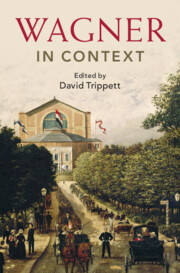Book contents
- Wagner in Context
- Composers in Context
- Wagner in Context
- Copyright page
- Contents
- Illustrations
- Musical Examples
- Contributors
- Acknowledgements
- Abbreviations
- Introduction
- I Place
- II People
- Chapter 9 Franz Liszt
- Chapter 10 Nietzsche and Wagner: The Logic of Contradiction
- Chapter 11 Wagner, Schopenhauer, and the World as a Phantasmagoria
- Chapter 12 Assessing Wilhelmine Schröder-Devrient: Influence, Genre, and Voice
- Chapter 13 Cosima Wagner
- Chapter 14 The Wagner Family: Rebellion, Honour, Aftermath
- III Politics, Ideas, and Bodies
- IV Life, Language, and the Ancient World
- V Music and Performance
- VI Reception
- Further Reading
- Select Bibliography
- Index
Chapter 11 - Wagner, Schopenhauer, and the World as a Phantasmagoria
from II - People
Published online by Cambridge University Press: 14 March 2024
- Wagner in Context
- Composers in Context
- Wagner in Context
- Copyright page
- Contents
- Illustrations
- Musical Examples
- Contributors
- Acknowledgements
- Abbreviations
- Introduction
- I Place
- II People
- Chapter 9 Franz Liszt
- Chapter 10 Nietzsche and Wagner: The Logic of Contradiction
- Chapter 11 Wagner, Schopenhauer, and the World as a Phantasmagoria
- Chapter 12 Assessing Wilhelmine Schröder-Devrient: Influence, Genre, and Voice
- Chapter 13 Cosima Wagner
- Chapter 14 The Wagner Family: Rebellion, Honour, Aftermath
- III Politics, Ideas, and Bodies
- IV Life, Language, and the Ancient World
- V Music and Performance
- VI Reception
- Further Reading
- Select Bibliography
- Index
Summary
To illuminate the notion of ‘totality’ in Wagner’s conception of the ‘total art work’ or Gesamtkunstwerk, this chapter invokes Schopenhauer’s claim that ordinary life is like a phantasmagoria or dream – a claim that epitomises his interpretation of Kant’s theory of knowledge. The chapter associates the notion of a phantasmagoria with that of a dream, and the latter with the nineteenth-century conception of the unconscious, in particular as presented in Freud’s characterisation of dreams as multidimensional semantic expressions. Wagner’s operas are accordingly considered to be phantasmagorias in this dream-associated sense. Wagner is often appreciated as a forefather of modernism, but by recognising the phantasmagoric, semantically-multidimensional quality of his operas he can be seen further as a forefather of postmodernism.
Keywords
- Type
- Chapter
- Information
- Wagner in Context , pp. 113 - 121Publisher: Cambridge University PressPrint publication year: 2024

